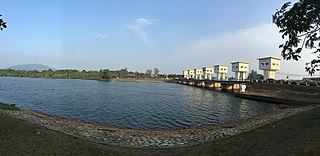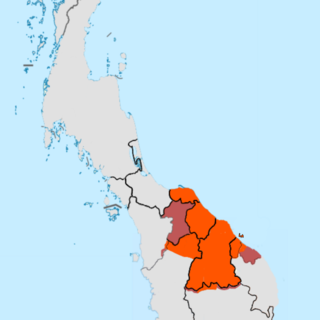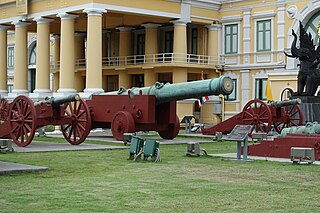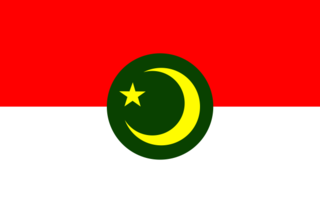
Narathiwat is one of the southern provinces (changwat) of Thailand. Neighbouring provinces are Yala and Pattani. To the south it borders the Malaysian state of Kelantan and Perak. The southern railway line ends in this province, which is one of the nation's four provinces that border Malaysia. The province features a range of cultures as well as natural resources, and is relatively fertile. Narathiwat is about 1,140 kilometers south of Bangkok and has an area of 4,475 km2 (1,728 sq mi). Seventy-five percent of the area is jungle and mountains and has a tropical climate.

Yala is the southernmost Province (changwat) of Thailand. Neighboring provinces are Songkhla, Pattani, and Narathiwat. Yala is one of two landlocked provinces in southern Thailand, the other being Phatthalung. Its southern part borders Kedah and Perak of Malaysia.

PataniDarussalam is a historical region and sultanate in the Malay Peninsula. It includes the southern Thai provinces of Pattani, Yala (Jala), Narathiwat (Menara), and parts of Songkhla (Singgora). Its capital was the town of Patani.

Kelantan-Pattani Malay is an Austronesian language of the Malayic subfamily spoken in the Malaysian state of Kelantan, as well as in Besut and Setiu districts of Terengganu state and the Perhentian Islands, and in the southernmost provinces of Thailand. It is the primary spoken language of Thai Malays and used as a lingua franca by ethnic Southern Thais in rural areas, Muslim and non-Muslim and the Sam-Sam, a mostly Thai-speaking population of mixed Malay and Thai ancestry.

The South Thailand insurgency is an ongoing conflict centered in southern Thailand. It originated in 1948 as an ethnic and religious separatist insurgency in the historical Malay Patani Region, made up of the three southernmost provinces of Thailand and parts of a fourth, but has become more complex and increasingly violent since the early 2000s from drug cartels, oil smuggling networks, and sometimes pirate raids.
The 2005 Songkhla bombings were a series of three bombings that took place on 3 April 2005 in the cities of Hat Yai and Songkhla of Thailand's Songkhla Province. They and are believed to be part of the ongoing south Thailand insurgency. At least two people were killed and 66 were injured in the explosions.
The Islamic Liberation Front of Patani, until 1986 known as the National Liberation Front of Patani is a militant Islamic separatist movement based in northern Malaysia and with a history of operations in the South Thailand insurgency.

Phaya Tani is a 17th-century siege cannon from Pattani Province in southern Thailand. It is the largest cannon ever cast in what is now Thailand, measuring 2.7 m long and made of brass. It is on display in front of the Ministry of Defence, opposite the Grand Palace in Bangkok. The cannon still serves as the symbol of Pattani Province and it has been on the official seal of Pattani Province since 1939.

The Patani United Liberation Organisation is a separatist insurgent group in Thailand, calling for an independent Patani. It was founded in 1968 in Saudi Arabia. This organization composed the national anthem of Patani called Lagu Kebangsaan Patani.

The Barisan Revolusi Nasional Melayu Patani, also known by the shorter form Barisan Revolusi Nasional ), meaning "National Revolutionary Front", is an Islamist Patani independence movement in northern Malaysia and Patani, southern Thailand. As of 2017, it is the most powerful rebel group in the region.
Gerakan, meaning movement in Malay, can refer to:

Thai Malays, with officially recognised terms including 'Malayu-descended Thais' and 'Malay', is a term used to refer to ethnic Malay citizens of Thailand, the sixth largest ethnic group in Thailand. Thailand is home to the third largest ethnic Malay population after Malaysia and Indonesia and most Malays are concentrated in the Southern provinces of Narathiwat, Pattani, Yala, Songkhla, and Satun. Phuket Ranong, and Trang home to a sizeable Muslim population, also have many people who are of Malay descent. A sizeable community also exists in Thailand's capital Bangkok, having descended from migrants or deportees who were relocated from the South from the 13th century onwards.
Mujahideen, or Mujahidin, is the plural form of mujahid, an Arabic term that broadly refers to people who engage in jihad, interpreted in a jurisprudence of Islam as the fight on behalf of God, religion or the community (ummah).
Wan Abdul Kadir Che Man is a Thai-Malay scholar and separatist politician. He was the president of Bersatu, a former umbrella group of separatists in south Thailand. He lives in exile in Malaysia.

The 2012 Southern Thailand bombings were a series of bombings that took place in Yala, Yala Province and in Hat Yai, Songkhla Province, on 31 March 2012.
The Kumpulan Mujahidin Malaysia (KMM), or Malaysian Mujahideen Movement, is/was a terrorist organisation that supported an overthrow of the Mahathir government and is/was for the creation of a pan-regional Islamic state comprising southern Thailand, the entirety of Indonesia, and the southern Philippines. It is believed to be self-financing and is often tied in correlation to smaller more extremist groups in Southeast Asia. The KMM is often cited as being associated with the Jemaah Islamiyah or JI. The Malaysian government, which is actively fighting against the Malaysian Mujahideen Movement, has arrested anywhere from 70 to 80 terrorists. The government currently has 48 members in total detained.
The Pattani Islamic Mujahideen Movement is an Islamist militant insurgent group that has carried out violent actions as part of the protracted insurgency in Southern Thailand.
The Runda Kumpulan Kecil is a jihadism insurgent group operating in three southern border provinces of Thailand and some areas of Songkhla province.
This article lists a chronology of events in the South Thailand insurgency from the 1960s. Most take place in the Muslim-majority, contested provinces of Narathiwat, Pattani, and Yala in the far south of Thailand bordering Muslim Malaysia.










